(完整版)延续性动词和非延续动词转换和练习(精华)
- 格式:doc
- 大小:31.01 KB
- 文档页数:2
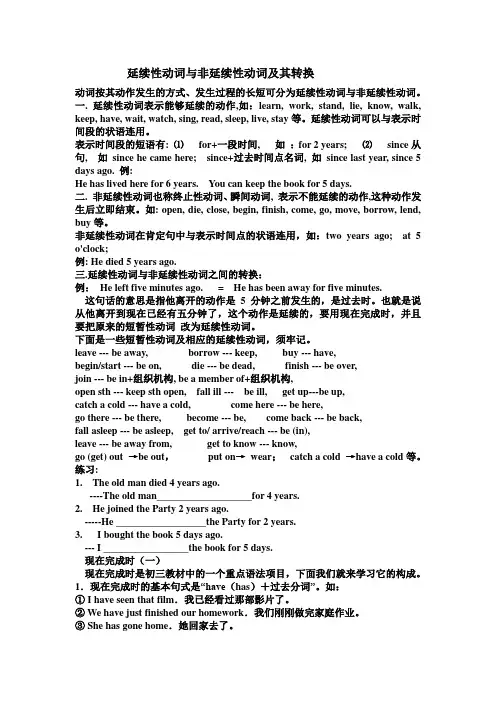
延续性动词与非延续性动词及其转换动词按其动作发生的方式、发生过程的长短可分为延续性动词与非延续性动词。
一. 延续性动词表示能够延续的动作,如:learn, work, stand, lie, know, walk, keep, have, wait, watch, sing, read, sleep, live, stay等。
延续性动词可以与表示时间段的状语连用。
表示时间段的短语有: ⑴for+一段时间, 如:for 2 years; ⑵since从句, 如since he came here; since+过去时间点名词, 如since last year, since 5 days ago. 例:He has lived here for 6 years. You can keep the book for 5 days.二. 非延续性动词也称终止性动词、瞬间动词, 表示不能延续的动作,这种动作发生后立即结束。
如: open, die, close, begin, finish, come, go, move, borrow, lend, buy等。
非延续性动词在肯定句中与表示时间点的状语连用,如:two years ago; at 5 o'clock;例: He died 5 years ago.三.延续性动词与非延续性动词之间的转换:例:He left five minutes ago. = He has been away for five minutes.这句话的意思是指他离开的动作是5分钟之前发生的,是过去时。
也就是说从他离开到现在已经有五分钟了,这个动作是延续的,要用现在完成时,并且要把原来的短暂性动词改为延续性动词。
下面是一些短暂性动词及相应的延续性动词,须牢记。
leave --- be away, borrow --- keep, buy --- have,begin/start --- be on, die --- be dead, finish --- be over,join --- be in+组织机构, be a member of+组织机构,open sth --- keep sth open, fall ill --- be ill, get up---be up,catch a cold --- have a cold, come here --- be here,go there --- be there, become --- be, come back --- be back,fall asleep --- be asleep, get to/ arrive/reach --- be (in),leave --- be away from, get to know --- know,go (get) out →be out,put on→wear;catch a cold →have a cold等。
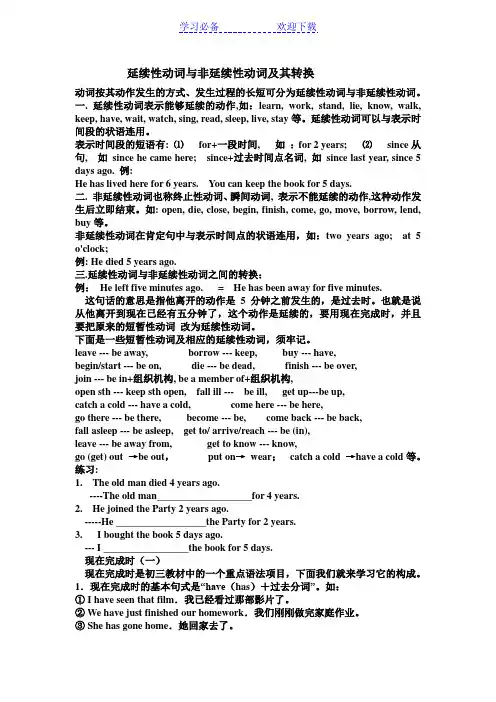
延续性动词与非延续性动词及其转换动词按其动作发生的方式、发生过程的长短可分为延续性动词与非延续性动词。
一. 延续性动词表示能够延续的动作,如:learn, work, stand, lie, know, walk, keep, have, wait, watch, sing, read, sleep, live, stay等。
延续性动词可以与表示时间段的状语连用。
表示时间段的短语有: ⑴for+一段时间, 如:for 2 years; ⑵since从句, 如since he came here; since+过去时间点名词, 如since last year, since 5 days ago. 例:He has lived here for 6 years. You can keep the book for 5 days.二. 非延续性动词也称终止性动词、瞬间动词, 表示不能延续的动作,这种动作发生后立即结束。
如: open, die, close, begin, finish, come, go, move, borrow, lend, buy等。
非延续性动词在肯定句中与表示时间点的状语连用,如:two years ago; at 5 o'clock;例: He died 5 years ago.三.延续性动词与非延续性动词之间的转换:例:He left five minutes ago. = He has been away for five minutes.这句话的意思是指他离开的动作是5分钟之前发生的,是过去时。
也就是说从他离开到现在已经有五分钟了,这个动作是延续的,要用现在完成时,并且要把原来的短暂性动词改为延续性动词。
下面是一些短暂性动词及相应的延续性动词,须牢记。
leave --- be away, borrow --- keep, buy --- have,begin/start --- be on, die --- be dead, finish --- be over,join --- be in+组织机构, be a member of+组织机构,open sth --- keep sth open, fall ill --- be ill, get up---be up,catch a cold --- have a cold, come here --- be here,go there --- be there, become --- be, come back --- be back,fall asleep --- be asleep, get to/ arrive/reach --- be (in),leave --- be away from, get to know --- know,go (get) out →be out,put on→wear;catch a cold →have a cold等。
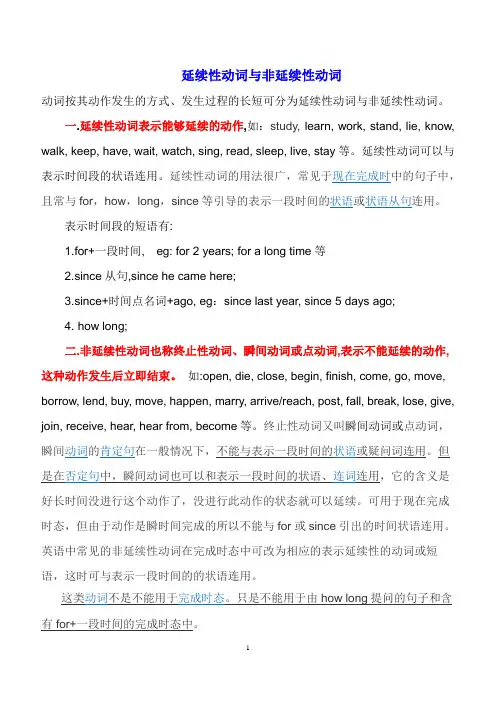
延续性动词与非延续性动词动词按其动作发生的方式、发生过程的长短可分为延续性动词与非延续性动词。
一.延续性动词表示能够延续的动作,如:study, learn, work, stand, lie, know, walk, keep, have, wait, watch, sing, read, sleep, live, stay等。
延续性动词可以与表示时间段的短语有:1.for+一段时间, eg: for 2 years; for a long time等2.since从句,since he came here;3.since+时间点名词+ago, eg:since last year, since 5 days ago;4. how long;二.非延续性动词也称终止性动词、瞬间动词或点动词,表示不能延续的动作,这种动作发生后立即结束。
如:open, die, close, begin, finish, come, go, move, borrow, lend, buy, move, happen, marry, arrive/reach, post, fall, break, lose, give,常见的这类动词有:go, come, leave, arrive, lose, land, catch, join, kill, find 等。
例如:1. He has joined the club for a long time. ( 错)2. He has been a member of the club for a long time. ( 对)3. His grandfather has died for over 30 years. ( 错)4. His grandfather has been dead for over 30 years. ( 对)【注意】之所以将这些动词称为瞬间动词,是因为这些动词在眨眼之间发生并终结。
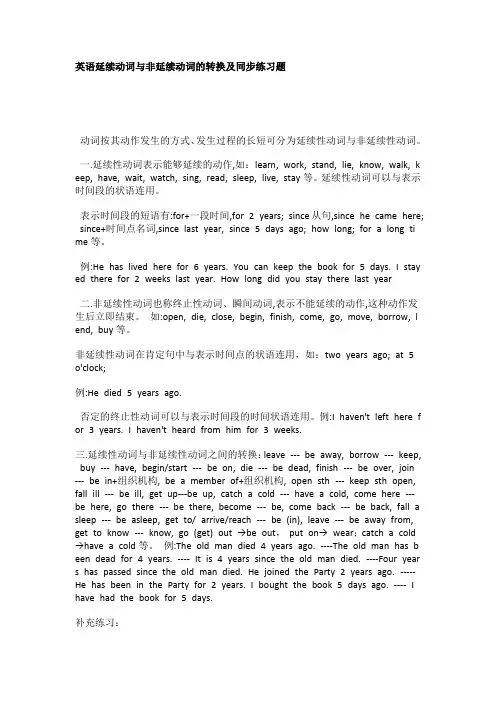
英语延续动词与非延续动词的转换及同步练习题动词按其动作发生的方式、发生过程的长短可分为延续性动词与非延续性动词。
一.延续性动词表示能够延续的动作,如:learn, work, stand, lie, know, walk, k eep, have, wait, watch, sing, read, sleep, live, stay等。
延续性动词可以与表示时间段的状语连用。
表示时间段的短语有:for+一段时间,for 2 years; since从句,since he came here; since+时间点名词,since last year, since 5 days ago; how long; for a long ti me等。
例:He has lived here for 6 years. You can keep the book for 5 days. I stay ed there for 2 weeks last year. How long did you stay there last year二.非延续性动词也称终止性动词、瞬间动词,表示不能延续的动作,这种动作发生后立即结束。
如:open, die, close, begin, finish, come, go, move, borrow, l end, buy等。
非延续性动词在肯定句中与表示时间点的状语连用,如:two years ago; at 5 o'clock;例:He died 5 years ago.否定的终止性动词可以与表示时间段的时间状语连用。
例:I haven't left here f or 3 years. I haven't heard from him for 3 weeks.三.延续性动词与非延续性动词之间的转换:leave --- be away, borrow --- keep, buy --- have, begin/start --- be on, die --- be dead, finish --- be over, join --- be in+组织机构, be a member of+组织机构, open sth --- keep sth open, fall ill --- be ill, get up---be up, catch a cold --- have a cold, come here --- be here, go there --- be there, become --- be, come back --- be back, fall a sleep --- be asleep, get to/ arrive/reach --- be (in), leave --- be away from, get to know --- know, go (get) out →be out,put on→ wear;catch a cold →have a cold等。
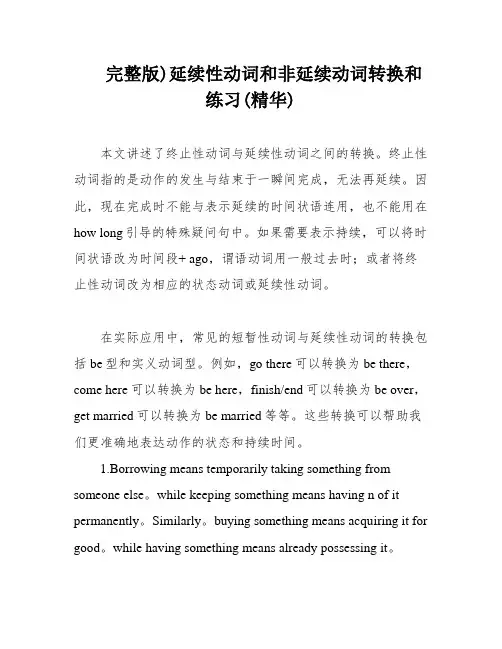
完整版)延续性动词和非延续动词转换和练习(精华)本文讲述了终止性动词与延续性动词之间的转换。
终止性动词指的是动作的发生与结束于一瞬间完成,无法再延续。
因此,现在完成时不能与表示延续的时间状语连用,也不能用在how long引导的特殊疑问句中。
如果需要表示持续,可以将时间状语改为时间段+ ago,谓语动词用一般过去时;或者将终止性动词改为相应的状态动词或延续性动词。
在实际应用中,常见的短暂性动词与延续性动词的转换包括be型和实义动词型。
例如,go there可以转换为be there,come here可以转换为be here,finish/end可以转换为be over,get married可以转换为be married等等。
这些转换可以帮助我们更准确地表达动作的状态和持续时间。
1.Borrowing means temporarily taking something from someone else。
while keeping something means having n of it permanently。
Similarly。
buying something means acquiring it for good。
while having something means already possessing it。
2.Instead of saying "begin to teach," we can simply say "teach."3.Getting to know someone means ing acquainted with them。
while knowing someone means already having a nship with them。
4.Putting on clothes means dressing oneself。

延续性动词与非延续性动词及其转换动词按其动作发生的方式、发生过程的长短可分为延续性动词与非延续性动词。
一. 延续性动词表示能够延续的动作,如:learn, work, stand, lie, know, walk, keep, have, wait, watch, sing, read, sleep, live, stay等。
延续性动词可以与表示时间段的状语连用。
表示时间段的短语有: ⑴for+一段时间, 如:for 2 years; ⑵since从句, 如since he came here; since+过去时间点名词, 如since last year, since 5 days ago. 例:He has lived here for 6 years. You can keep the book for 5 days.二. 非延续性动词也称终止性动词、瞬间动词, 表示不能延续的动作,这种动作发生后立即结束。
如: open, die, close, begin, finish, come, go, move, borrow, lend, buy等。
非延续性动词在肯定句中与表示时间点的状语连用,如:two years ago; at 5 o'clock;例: He died 5 years ago.三.延续性动词与非延续性动词之间的转换:例:He left five minutes ago. = He has been away for five minutes.这句话的意思是指他离开的动作是5分钟之前发生的,是过去时。
也就是说从他离开到现在已经有五分钟了,这个动作是延续的,要用现在完成时,并且要把原来的短暂性动词改为延续性动词。
下面是一些短暂性动词及相应的延续性动词,须牢记。
leave --- be away, borrow --- keep, buy --- have,begin/start --- be on, die --- be dead, finish --- be over,join --- be in+组织机构, be a member of+组织机构,open sth --- keep sth open, fall ill --- be ill, get up---be up,catch a cold --- have a cold, come here --- be here,go there --- be there, become --- be, come back --- be back,fall asleep --- be asleep, get to/ arrive/reach --- be (in),leave --- be away from, get to know --- know,go (get) out →be out,put on→wear;catch a cold →have a cold等。
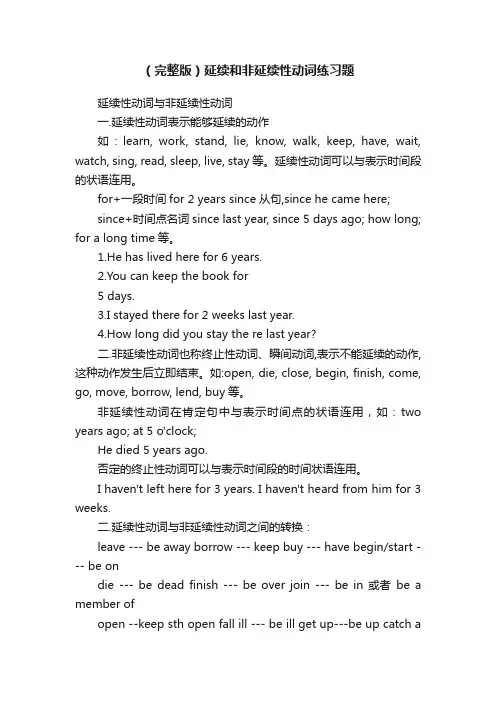
(完整版)延续和非延续性动词练习题延续性动词与非延续性动词一.延续性动词表示能够延续的动作如:learn, work, stand, lie, know, walk, keep, have, wait, watch, sing, read, sleep, live, stay等。
延续性动词可以与表示时间段的状语连用。
for+一段时间for 2 years since从句,since he came here;since+时间点名词since last year, since 5 days ago; how long; for a long time等。
1.He has lived here for 6 years.2.You can keep the book for5 days.3.I stayed there for 2 weeks last year.4.How long did you stay the re last year?二.非延续性动词也称终止性动词、瞬间动词,表示不能延续的动作,这种动作发生后立即结束。
如:open, die, close, begin, finish, come, go, move, borrow, lend, buy等。
非延续性动词在肯定句中与表示时间点的状语连用,如:two years ago; at 5 o'clock;He died 5 years ago.否定的终止性动词可以与表示时间段的时间状语连用。
I haven't left here for 3 years. I haven't heard from him for 3 weeks.二.延续性动词与非延续性动词之间的转换:leave --- be away borrow --- keep buy --- have begin/start --- be ondie --- be dead finish --- be over join --- be in 或者be a member ofopen --keep sth open fall ill --- be ill get up---be up catch acold --- have a coldcome here --- be here go there --- be there become --- be come back --- be backfall asleep --- be asleep get to/ arrive/reach --- be (in) leave --- be away fromget to know --- know go (get) out →be out put on→ wear catch a cold →have a cold例:The old man died 4 years ago. ----The old man has been dead for 4 years.翻译下列句子:1. 你曾经吃过鱼吗?___________________________________________2. 我刚刚丢了我的语文书。
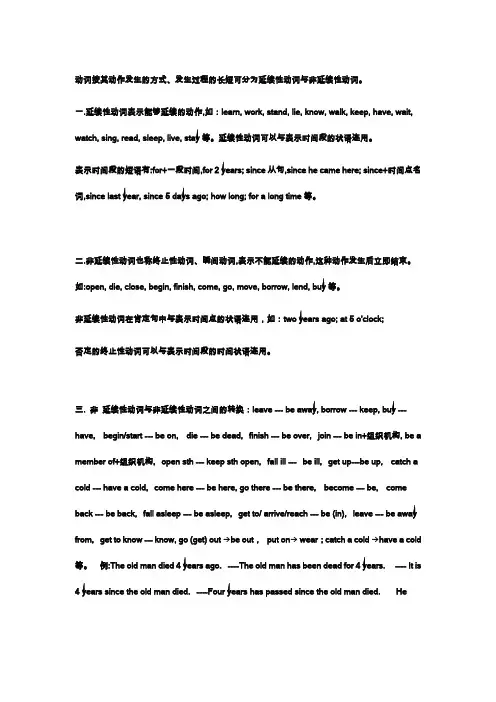
动词按其动作发生的方式、发生过程的长短可分为延续性动词与非延续性动词。
一.延续性动词表示能够延续的动作,如:learn, work, stand, lie, know, walk, keep, have, wait, watch, sing, read, sleep, live, stay等。
延续性动词可以与表示时间段的状语连用。
表示时间段的短语有:for+一段时间,for 2 years; since从句,since he came here; since+时间点名词,since last year, since 5 days ago; how long; for a long time等。
二.非延续性动词也称终止性动词、瞬间动词,表示不能延续的动作,这种动作发生后立即结束。
如:open, die, close, begin, finish, come, go, move, borrow, lend, buy等。
非延续性动词在肯定句中与表示时间点的状语连用,如:two years ago; at 5 o'clock;否定的终止性动词可以与表示时间段的时间状语连用。
三. 非延续性动词与非延续性动词之间的转换:leave --- be away, borrow --- keep, buy --- have,begin/start --- be on,die --- be dead,finish --- be over,join --- be in+组织机构, be a member of+组织机构,open sth --- keep sth open,fall ill ---be ill,get up---be up,catch a cold --- have a cold,come here --- be here, go there --- be there,become --- be,come back --- be back,fall asleep --- be asleep,get to/ arrive/reach --- be (in),leave --- be away from,get to know --- know, go (get) out →be out,put on→ wear;catch a cold →have a cold 等。

延续性动词与非延续性动词及其转换动词按其动作发生的方式、发生过程的长短可分为延续性动词与非延续性动词。
一. 延续性动词表示能够延续的动作,如:learn, work, stand, lie, know, walk, keep, have, wait, watch, sing, read, sleep, live, stay等。
延续性动词可以与表示时间段的状语连用。
表示时间段的短语有: ⑴for+一段时间, 如:for 2 years; ⑵since从句, 如since he came here; since+过去时间点名词, 如since last year, since 5 days ago. 例:He has lived here for 6 years. You can keep the book for 5 days.二. 非延续性动词也称终止性动词、瞬间动词, 表示不能延续的动作,这种动作发生后立即结束。
如: open, die, close, begin, finish, come, go, move, borrow, lend, buy等。
非延续性动词在肯定句中与表示时间点的状语连用,如:two years ago; at 5 o'clock;例: He died 5 years ago.三.延续性动词与非延续性动词之间的转换:例:He left five minutes ago. = He has been away for five minutes.这句话的意思是指他离开的动作是5分钟之前发生的,是过去时。
也就是说从他离开到现在已经有五分钟了,这个动作是延续的,要用现在完成时,并且要把原来的短暂性动词改为延续性动词。
下面是一些短暂性动词及相应的延续性动词,须牢记。
leave --- be away, borrow --- keep, buy --- have,begin/start --- be on, die --- be dead, finish --- be over,join --- be in+组织机构, be a member of+组织机构,open sth --- keep sth open, fall ill --- be ill, get up---be up,catch a cold --- have a cold, come here --- be here,go there --- be there, become --- be, come back --- be back,fall asleep --- be asleep, get to/ arrive/reach --- be (in),leave --- be away from, get to know --- know,go (get) out →be out,put on→wear;catch a cold →have a cold等。

延续性动词与非延续性动词及其转换动词按其动作发生的方式、发生过程的长短可分为延续性动词与非延续性动词。
一. 延续性动词表示能够延续的动作,如:learn, work, stand, lie, know, walk, keep, have, wait, watch, sing, read, sleep, live, stay等。
延续性动词可以与表示时间段的状语连用。
表示时间段的短语有: ⑴for+一段时间, 如:for 2 years; ⑵since从句, 如since he came here; since+过去时间点名词, 如since last year, since 5 days ago. 例:He has lived here for 6 years. You can keep the book for 5 days.二. 非延续性动词也称终止性动词、瞬间动词, 表示不能延续的动作,这种动作发生后立即结束。
如: open, die, close, begin, finish, come, go, move, borrow, lend, buy等。
非延续性动词在肯定句中与表示时间点的状语连用,如:two years ago; at 5 o'clock;例: He died 5 years ago.三.延续性动词与非延续性动词之间的转换:例:He left five minutes ago. = He has been away for five minutes.这句话的意思是指他离开的动作是5分钟之前发生的,是过去时。
也就是说从他离开到现在已经有五分钟了,这个动作是延续的,要用现在完成时,并且要把原来的短暂性动词改为延续性动词。
下面是一些短暂性动词及相应的延续性动词,须牢记。
leave --- be away, borrow --- keep, buy --- have,begin/start --- be on, die --- be dead, finish --- be over,join --- be in+组织机构, be a member of+组织机构,open sth --- keep sth open, fall ill --- be ill, get up---be up,catch a cold --- have a cold, come here --- be here,go there --- be there, become --- be, come back --- be back,fall asleep --- be asleep, get to/ arrive/reach --- be (in),leave --- be away from, get to know --- know,go (get) out →be out,put on→wear;catch a cold →have a cold等。

延续性动词和非延续动词转换和练习精华集团文件发布号:(9816-UATWW-MWUB-WUNN-INNUL-DQQTY-终止性动词与延续性动词之间的转换终止性动词(也可称为非延续性动词,瞬间动词,点动词或短暂性动词),如begin,start,die,buy,leave, come等,表示动作的发生与结束于一瞬间完成,不能再延续,所以它的现在完成时不能和表示延续的时间状语连用,即不能与表示一段时间的状语,for+时间段, since+时间点/从句连用,也不能用在how long引导的特殊疑问句中.终止性动词要表示持续时, 可用以下方法:⑴.将时间状语改为时间段 + ago,句中谓语动词用一般过去时.eg.我弟弟参军两年了. My brother joined the army two years ago.⑵.若保留for+时间段,since+时间点/从句, 或用在 how long 句型中,则需将终止性动词改为相应的状态动词或延续性动词The film started two hours ago.→The film has been on for two hours.常见短暂性动词与延续性动词的转换Ⅰ. be 型1. go there -- be theree here—be heree back—be back4.die—be dead5.leave—be away(from)6.open—be open7.close—be closed 8.go/get out—be out9.finish/end-- be over 10.become—be11.get up—be up 12.begin/start(上演)—be on13. fall asleep-- be asleep 14.fall ill – be ill15. move here/there --be here/there 16. get to… --be at/in17.arr ive at / in… -- be at / in 18.reach…-- be at/in19.get married --be married 20.join—be in/be a member ofjoin the Party-- be in the Party / be a Party member/ be a member of the PartyⅡ. 实义动词型1.borrow-- keep2. buy——have3.Begin to teach—teach4. get to know—know5.Put on—wear6. receive--have7.catch a cold—have a cold 8.hear from—have a letter from[注意点]1.上述例词除borrow/buy/catch需转换为keep /have外,其余均为“be+adj./adv./n.”结构。
英语延续动词与非延续动词的转换及同步练习题动词按其动作发生的方式、发生过程的长短可分为延续性动词与非延续性动词。
一.延续性动词表示能够延续的动作,如:learn, work, stand, lie, k now, walk, keep, have, wait, watch, sing, read, sleep, live, stay等。
延续性动词可以与表示时间段的状语连用。
表示时间段的短语有:for+一段时间,for 2 years; since从句,since he came here; since+时间点名词,since last year, since 5 days ago; how long; for a long time等。
例:He has lived here for 6 years. You can keep the book for 5 days. I stayed there for 2 weeks last year. How long did you stay there last year?二.非延续性动词也称终止性动词、瞬间动词,表示不能延续的动作,这种动作发生后立即结束。
如:open, die, close, begin, finish, come, go, move, borrow, lend, buy等。
非延续性动词在肯定句中与表示时间点的状语连用,如:two years ago; at 5 o'clock;例:He died 5 years ago.否定的终止性动词可以与表示时间段的时间状语连用。
例:I haven't l eft here for 3 years. I haven't heard from him for 3 weeks.三.延续性动词与非延续性动词之间的转换:leave --- be away, borrow --- keep, buy --- have, begin/start --- be on, die --- be dead, finish --- be over, join --- be in+组织机构, be a member of+组织机构, open sth --- keep sth open, fall ill --- be ill, getup---be up, catch a cold --- have a cold, come here --- be here, go there --- be there, become --- be, come back --- be bac k, fall asleep --- be asleep, get to/ arrive/reach --- be (in), leave --- be away from, get to know --- know, go (get) ou t →be out,put on→ wear;catch a cold →have a cold等。
延续性动词与非延续性动词及其转换动词按其动作发生的方式、发生过程的长短可分为延续性动词与非延续性动词。
一. 延续性动词表示能够延续的动作,如:learn, work, stand, lie, know, walk, keep, have, wait, watch, sing, read, sleep, live, stay等。
延续性动词可以与表示时间段的状语连用。
表示时间段的短语有: ⑴for+一段时间, 如:for 2 years; ⑵since从句, 如since he came here; since+过去时间点名词, 如since last year, since 5 days ago. 例:He has lived here for 6 years. You can keep the book for 5 days.二. 非延续性动词也称终止性动词、瞬间动词, 表示不能延续的动作,这种动作发生后立即结束。
如: open, die, close, begin, finish, come, go, move, borrow, lend, buy等。
非延续性动词在肯定句中与表示时间点的状语连用,如:two years ago; at 5 o'clock;例: He died 5 years ago.三.延续性动词与非延续性动词之间的转换:例:He left five minutes ago. = He has been away for five minutes.这句话的意思是指他离开的动作是5分钟之前发生的,是过去时。
也就是说从他离开到现在已经有五分钟了,这个动作是延续的,要用现在完成时,并且要把原来的短暂性动词改为延续性动词。
下面是一些短暂性动词及相应的延续性动词,须牢记。
leave --- be away, borrow --- keep, buy --- have,begin/start --- be on, die --- be dead, finish --- be over,join --- be in+组织机构, be a member of+组织机构,open sth --- keep sth open, fall ill --- be ill, get up---be up,catch a cold --- have a cold, come here --- be here,go there --- be there, become --- be, come back --- be back,fall asleep --- be asleep, get to/ arrive/reach --- be (in),leave --- be away from, get to know --- know,go (get) out →be out,put on→wear;catch a cold →have a cold等。
英语延续动词与非延续动词的转换及同步练习题动词按其动作发生的方式、发生过程的长短可分为延续性动词与非延续性动词。
一.延续性动词表示能够延续的动作,如:learn, work, stand, lie, know, walk, keep, have, wait, watch, sing, read, sleep, live, stay等。
延续性动词可以与表示时间段的状语连用。
表示时间段的短语有:for+一段时间, since从句,since+时间点名词, how long; for a long time等。
例:He has lived here for 6 years.You can keep the book for 5 days.I stayed there for 2 weeks last year.How long did you stay there last year?二.非延续性动词也称终止性动词、瞬间动词,表示不能延续的动作,这种动作发生后立即结束。
如:open, die, close, begin, finish, come, go, move, borrow, lend, buy等。
非延续性动词在肯定句中与表示时间点的状语连用,如:two years ago; at 5 o'clock;例:He died 5 years ago.否定的终止性动词可以与表示时间段的时间状语连用。
例:I haven't left here for 3 years.I haven't heard from him for 3 weeks.三.延续性动词与非延续性动词之间的转换:leave --be away, borrow --keep, buy --have, begin/start --- be on, die --be dead, finish --be over, join -- be in+组织机构, be a member of+组织机构, open sth -- keep sth open,fall ill --be ill,get up---be up, catch a cold --- have a cold, come here --- be here, go there --- be there, become --- be, come back --- be back, fall asleep --- be asleep, get to/ arrive/reach --- be (in), leave --- be away from, get to know --- know, go (get) out →be out,put on→wear;catch a cold →have a cold等。
延续性动词与非延续性动词及其转换动词按其动作发生的方式、发生过程的长短可分为延续性动词与非延续性动词。
一. 延续性动词表示能够延续的动作,如:learn, work, stand, lie, know, walk, keep, have, wait, watch, sing, read, sleep, live, stay等。
延续性动词可以与表示时间段的状语连用。
表示时间段的短语有: ⑴for+一段时间, 如:for 2 years; ⑵since从句, 如since he came here; since+过去时间点名词, 如since last year, since 5 days ago. 例:He has lived here for 6 years. You can keep the book for 5 days.二. 非延续性动词也称终止性动词、瞬间动词, 表示不能延续的动作,这种动作发生后立即结束。
如: open, die, close, begin, finish, come, go, move, borrow, lend, buy等。
非延续性动词在肯定句中与表示时间点的状语连用,如:two years ago; at 5 o'clock;例: He died 5 years ago.三.延续性动词与非延续性动词之间的转换:例:He left five minutes ago. = He has been away for five minutes.这句话的意思是指他离开的动作是5分钟之前发生的,是过去时。
也就是说从他离开到现在已经有五分钟了,这个动作是延续的,要用现在完成时,并且要把原来的短暂性动词改为延续性动词。
下面是一些短暂性动词及相应的延续性动词,须牢记。
leave --- be away, borrow --- keep, buy --- have,begin/start --- be on, die --- be dead, finish --- be over,join --- be in+组织机构, be a member of+组织机构,open sth --- keep sth open, fall ill --- be ill, get up---be up,catch a cold --- have a cold, come here --- be here,go there --- be there, become --- be, come back --- be back,fall asleep --- be asleep, get to/ arrive/reach --- be (in),leave --- be away from, get to know --- know,go (get) out →be out,put on→wear;catch a cold →have a cold等。
延续性动词与非延续性动词及其转换动词按其动作发生的方式、发生过程的长短可分为延续性动词与非延续性动词。
一. 延续性动词表示能够延续的动作,如:learn, work, stand, lie, know, walk, keep, have, wait, watch, sing, read, sleep, live, stay等。
延续性动词可以与表示时间段的状语连用。
表示时间段的短语有: ⑴ for+一段时间, 如:for 2 years; ⑵ since从句, 如 since he came here; since+过去时间点名词, 如 since last year, since 5 days ago. 例:He has lived here for 6 years. You can keep the book for 5 days.二. 非延续性动词也称终止性动词、瞬间动词, 表示不能延续的动作,这种动作发生后立即结束。
如: open, die, close, begin, finish, come, go, move, borrow, lend, buy等。
非延续性动词在肯定句中与表示时间点的状语连用,如:two years ago; at 5 o'clock;例三.例:词。
练习现在完成时是初三教材中的一个重点语法项目,下面我们就来学习它的构成。
1.现在完成时的基本句式是“have(has)+过去分词”。
如:① I have seen that film.我已经看过那部影片了。
② We have just finished our homework.我们刚刚做完家庭作业。
③ She has gone home.她回家去了。
注意:1)该句式中的have或has是助动词,has用于第三人称单数,其它人称一律用have。
2)该句式中have(has)和过去分词之间可用just插入。
3)把该句式译成汉语时,往往用“已经”、“刚刚”、“过”或“了”等。
延续性动词与非延续性动词及其转换动词按其动作发生的方式、发生过程的长短可分为延续性动词与非延续性动词。
一.延续性动词表示能够延续的动作,如:learn, work, stand, lie, know, walk, keep, have, wait, watch, sing, read, sleep, live, stay 等。
延续性动词可以与表示时间段的状语连用。
表示时间段的短语有:for+一段时间,for two years; since 从句,since he came here; since+时间点名词,since last year, since five days ago; how long ; for a long time 等。
二.非延续性动词也称终止性动词、瞬间动词,表示不能延续的动作,这种动作发生后立即结束。
如:open, die, close, begin, finish, come, go, move, borrow, lend, buy 等。
非延续性动词在肯定句中与表示时间点的状语连用,如:two years ago; at 5 o'clock;否定的终止性动词可以与表示时间段的时间状语连用。
如:I haven ’t heard from Uncle Wang for a long time. We haven ’t seen him since 1992.三.延续性动词与非延续性动词之间的转换:一些短暂性动词及相应的延续性动词:arrive (get to /reach )→ be here (in)begin(start) → be ondie → be deadcome here (back )→be here (back )leave → be away (from)fall ill(sick, asleep)→be ill(sick, asleep)get up→ be upgo/ get out (there )→ be out (there )finish → be over例:The old man died 4 years ago. --The old man has been dead for 4 years. = --- It is 4 years since the old man died. =---Four years has passed since the old man died.He joined the Party 2 years ago. =----He has been in the Party for 2 years.I bought the book 5 days ago. =-- I have had the book for 5 days.补充练习:1. When he arrived at the bus stop, the bus ________ for 20 minutes.A. has leftB. had leftC. has been awayD. had been away2. I ______ the League (共青团)for 5 years so far.A. joinedB. have joinedC. have been in3. The factory ________ since the February of 1988.A . has been open B. has opened C. was open D. opened4. Mary and Rose _______friends since they met in 2000.A. have madeB. have beenC. madeD. have become5.You mustn't ________ until he comes back.A. be awayB. leaveC. be left6.The meeting _______ for a week now.A. has finishedB. has endedC. has been over7.Miss Gao ______ this school for nearly 5 years.A. has been inB. has come toC. has taught8.Ben ______ a teacher for 4 years .A. has beenB. has becomeC. wasD. became9. I ______ home for a week.A. have returnedB. have been backC. returned10. How long _______ he ________ ?A. diedB. has, diedC. has, been dead put on → wear 或be on open → be open (keep sth. open ) join → be in 或 be a member of…+组织机构 close → be closed go to school → be a student borrow →keep buy/get →have catc h(a cold) → have(a cold) get to know → know begin to study → study come to work → work move to → live in finish → be over come to → be in sit down → be seated marry → be married dress → be dressed become → be11. He ______ at eight yesterday afternoon.A. sleptB. was sleepingC. has sleepD. had slept12.He ________ the car for a week.A. boughtB. has boughtC. has had13.-----How long _____ you _____ ill ? -----Two weeks.A. did fallB. have, fellC. have, been14.Since 2000, he _____ his hometown.A. has leftB. has moved awayC. has been away from15.I'll lend you the book , but you can only _____ it for 2 days.A. borrowB. keepC. take16.The bus ______ on the road for 2 hours so far.A. has stoppedB. stoppedC. has been17.Are you _____ the jacket these days?A. wearingB. putting onC. dressingD. on18.He ________ foe 2 hours.A. got upB. has got upC. has been up19. Tom is ill in hospital. He _______ a cold for several days.A. isB. catchesC. has caughtD. has had20.----- How long can I ______ the book? ------ Two weeks.A. borrowB. lendC. getD. keep时态和语态专项复习( ) 1. Don’t make so much noise. We _______ to the music.A. listenedB. listenC. are listeningD. have listened( ) 2. I must return the camera to Li Lei. I _______ it for two weeks.A. keepB. borrowedC. have keptD. have lent( ) 3. –When will you tell him the good news? --I will tell him about it as soon as he _______ back.A. comesB. cameC. will comeD. is coming( ) 4. –Dad, please open the door, it _______. –OK, dear. I’m coming.A. locksB. lockedC. is lockedD. was locked( ) 5. –Did you go to Jim’s birthday party? --No, I _______.A. am not invitedB. wasn’t invitedC. haven’t invitedD. didn’t invite( ) 6. A talk on Chinese history _______ in the school hall next week.A. be givenB. has been givenC. will be givenD. will give( ) 7. You may go fishing if your work _______.A. is doneB. will be doneC. has doneD. have done( ) 8. –What do you think of the football match yesterday?--Well. It’s surprising. The strongest team of our school _______.A. was beatenB. wonC. scoredD. was failed( ) 9. –Would your younger brother go for a picnic this Sunday? --If I don’t go, _______.A. so does heB. so he willC. neither will heD. neither does he( ) 10. The trees must _______ three times a week.A. waterB. is wateringC. be wateredD. waters( ) 11. –Did you see Tom at the party? -- No, he _______ by the time I got there.A. leftB. was leavingC. had leftD. has left( ) 12. –Why not go to see the dolphin show with me? --Because I ______ it.A. sawB. will seeC. seeD. have seen( ) 13. –Do you like watching cooking programs on TV?--No, I don’t, but my twin brother _______. He’s very fond of cooking.A. doesB. doC. isD. are( ) 14. Catherin _______ the letter before her mother came into her bedroom.A. has writtenB. was writtenC. had writtenD. is writing( ) 15. The old man is quite weak after the accident, so he _______.A. must take care ofB. must be take care ofC. must look afterD. must be looked after( ) 16. The ticket is on the floor. Would you please _______ for me?A. pick it upB. pick up itC. pick up themD. pick them up( ) 17. He _______ living in the country to the city.A. likesB. prefersC. enjoysD. loves( ) 18. How long have you _______ the book?A. boughtB. lentC. hadD. borrowed( ) 19. –Do you know him well ? --Sure. We _______ friend since ten years ago.A. wereB. have beenC. have becomeD. have made( ) 20. _______ me carefully, boys and girls. Can you _______ me?A. Listen to; hearB. Hear; listen toC. Hear; hearD. Listen to; hear from( ) 21. –These farmers have been to the United States. –Really? When ______ there?A. will they goB. did they goC. do they goD. have they gone( ) 22. I’m sorry I haven’t got any money. I _______ my handbag at home.A. have missedB. have leftC. have putD. have forgotten( ) 23. –Where is Miss Gao. Lily? --She _______ to the teacher s’.A. has beenB. has goneC. wentD. would go( ) 24. When her father came back home, Joan _______ with her friend.A. talkedB. talksC. is talkingD. was talking( ) 25. –What’s that thing with three legs?--It’s a cup. It ______ for drinking in the old days.A. usesB. usedC. is usedD. was used( ) 26. His uncle _______ in three days.A. returnsB. has returnedC. returnedD. will return( ) 27. –Hi, Lin Tao. I didn’t see you at the party. --Oh, I _______ ready for the maths exam.A. am gettingB. was gettingC. gotD. have got( ) 28. –Excuse me. What did you say you would like to do, Miss White?--I said I’d better go back to the office. I _______ something this afternoon.A. would meetB. meetC. am going to meetD. was meeting( ) 29. What _______ the forest in our country in the last ten years.A. has happened doB. is happened toC. has happened atD. is happening( ) 30. –What did Mr Jones do before he moved here?--He _______ a city bus for over twenty-five years.A. is drivingB. droveC. has drivenD. drives( ) 31. –When _______ you _______ your homework?--I had finished it before he _______ back.A. have; finished; cameB. have; finished; was comingC. did; finish; cameD. did; finish; was coming( ) 32. Look! The boys _______ happily in the river.A. swimB. swamC. will swimD. are swimming( ) 33. Every spring, many trees _______ along the river.A. were plantedB. is plantedC. will be plantedD. are planted( ) 34. The letter _______ in French. I can’t read it.A. is writingB. is writtenC. wroteD. writes( ) 35. If Mary _______ next Sunday, we will go boating together.A. will comeB. comesC. shall comeD. should come( ) 36. We expected that the English teacher _______ some advice on how to write an English letter.A. will giveB. gaveC. is going to giveD. would give( ) 37. Five years ago nobody knew him, although he _______ more than 100 songs.A. already wroteB. have already writtenC. had already writtenD. was already writing( ) 38. So far I _______ any success. However, I’ll keep trying.A. don’t haveB. didn’t haveC. haven’t hadD. won’t have( ) 39. It was the third time that I _______ in at his office.A. have droppedB. had droppedC. droppedD. was dropping( ) 40. I often see Tom _______ homework while I am watching TV every evening.A. doB. doingC. didD. to do( ) 41. The flowers want _______. Look, the soil is so dry.A. wateringB. being wateredC. to waterD. waters( ) 42. –Be careful! You might fall into the water.--Thank you. I ______ I _______ so close to the pool.A. didn’t know; am standingB. don’t know; am standingC. didn’t know; was standingD. didn’t know; would stand( ) 43. –Excuse me. Where is the sick boy sent here a moment ago?--He ______ by the doctor.A. has been examinedB. will be examinedC. is examinedD. is being examined( ) 44.—Have you got the airplane tickets?--No. when I _______ to the office, all the tickets to Beijing ______ out.A. get; have been soldB. got; had been soldC. got; had soldD. got; were being sold( ) 45. –Your name again? I _______ quite catch it. –Bartholomew Liveli.A. didn’tB. don’tC. couldn’tD. can’t( ) 46. – Whom are you waiting for?--Gary’s parents. But neither of them _______ yet.A. arrivedB. has arrivedC. are arrivingD. is arriving( ) 47. He _______ in bed all day long because he had a headache.A. lieB. layC. laidD. lied( ) 48. Would you _______ your voice a little so that everyone can hear you?A. riseB. putC. liftD. raise( ) 49. More and more people began to _______ that good health means good wealth.A. learnB. understandC. considerD. realize。
终止性动词与延续性动词之间的转换
终止性动词(也可称为非延续性动词,瞬间动词,点动词或短暂性动词),如begin,start,die,buy,leave, come等,表示动作的发生与结束于一瞬间完成,不能再延续,所以它的现在完成时不能和表示延续的时间状语连用,
即不能与表示一段时间的状语,for+时间段, since+时间点/从句连用,也不能用在how long引导的特殊疑问句中.
终止性动词要表示持续时, 可用以下方法:
⑴.将时间状语改为时间段+ ago,句中谓语动词用一般过去时.
eg.我弟弟参军两年了. My brother joined the army two years ago.
⑵.若保留for+时间段,since+时间点/从句, 或用在how long 句型中,则需将终止性动词改为相应的状态动词或延续性动词
The film started two hours ago.→The film has been on for two hours.
常见短暂性动词与延续性动词的转换
Ⅰ. be 型
1. go there -- be there
e here—be here
e back—be back
4.die—be dead
5.leave—be away(from)
6.open—be open
7.close—be closed 8.go/get out—be out
9.finish/end-- be over 10.become—be
11.get up—be up 12.begin/start(上演)—be on
13. fall asleep-- be asleep 14.fall ill – be ill
15. move here/there --be here/there 16. get to… --be at/in
17.arrive at / in… -- be at / in 18.reach…-- be at/in
19.get married --be married 20.join—be in/be a member of
join the Party-- be in the Party / be a Party member/ be a member of the Party
Ⅱ. 实义动词型
1.borrow-- keep
2. buy——have
3.Begin to teach—teach
4. get to know—know
5.Put on—wear
6. receive--have
7.catch a cold—have a cold 8.hear from—have a letter from
[注意点]
1.上述例词除borrow/buy/catch需转换为keep /have外,其余均为“be+adj./adv./n.”结构。
2.非延续性动词并非不可用于现在完成时态中,只是不能和表示“一段”时间的短语连用,但可与just,yet,already ,ever,never等连用。
例如:
They have already come.
He has just gone out.
延续性动词与非延续性动词专项练习
1. When he arrived at the bus stop, the bus ________ for 20 minutes.
A. has left
B. had left
C. has been away
D. had been away
2. I ______ the League for 5 years so far.
A. joined
B. have joined
C. have been in
3. The factory ________ since the February of 1988.
A . has been open B. has opened C. was open D. opened
4. Mary and Rose _______friends since they met in 2000.
A. have made
B. have been
C. made
D. have become
5.You mustn't ______ until he comes back. A. be away B. leave C. be left
6.The meeting _______ for a week now.
A. has finished
B. has ended
C. has been over
7.Miss Gao ______ this school for nearly 5 years.
A. has been in
B. has come to
C. has taught
8.Ben ______ a teacher for 4 years .
A. has been
B. has become
C. was
D. became
9. I ______ home for a week.
A. have returned
B. have been back
C. returned
10. How long ______ he ______ ? A. died B. has, died C. has, been dead
11. He ______ at eight yesterday afternoon.
A. slept
B. was sleeping
C. has sleep
D. had slept
12.He ________ the car for a week. A. bought B. has bought C. has had
13.-----How long _____ you _____ ill ? -----Two weeks.
A. did fall
B. have, fell
C. have, been
14.Since 2000, he _____ his hometown.
A. has left
B. has moved away
C. has been away from
15.I'll lend you the book , but you can only _____ it for 2 days.
A. borrow
B. keep
C. take
16.The bus ______ on the road for 2 hours so far.
A. has stopped
B. stopped
C. has been
17.Are you ___the jacket these days?
A. wearing
B. putting on
C. dressing
D. on
18.He ________ for 2 hours. A. got up B. has got up C. has been up
19. Tom is ill in hospital. He _______ a cold for several days.
A. is
B. catches
C. has caught
D. has had
20.----- How long can I ______ the book? ------ Two weeks.
A. borrow
B. lend
C. get
D. keep
DCABB CAABC BCCCB CACDD。